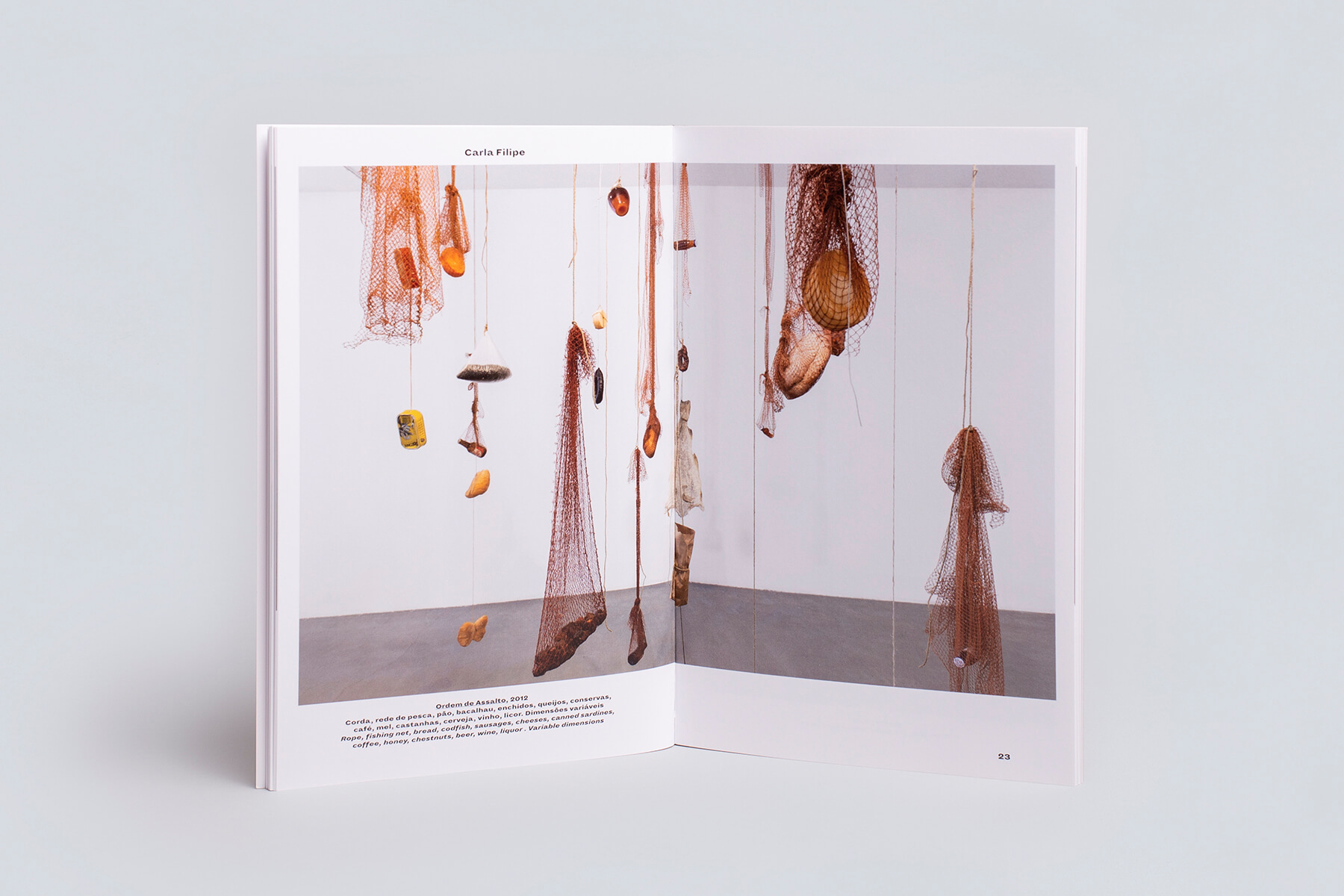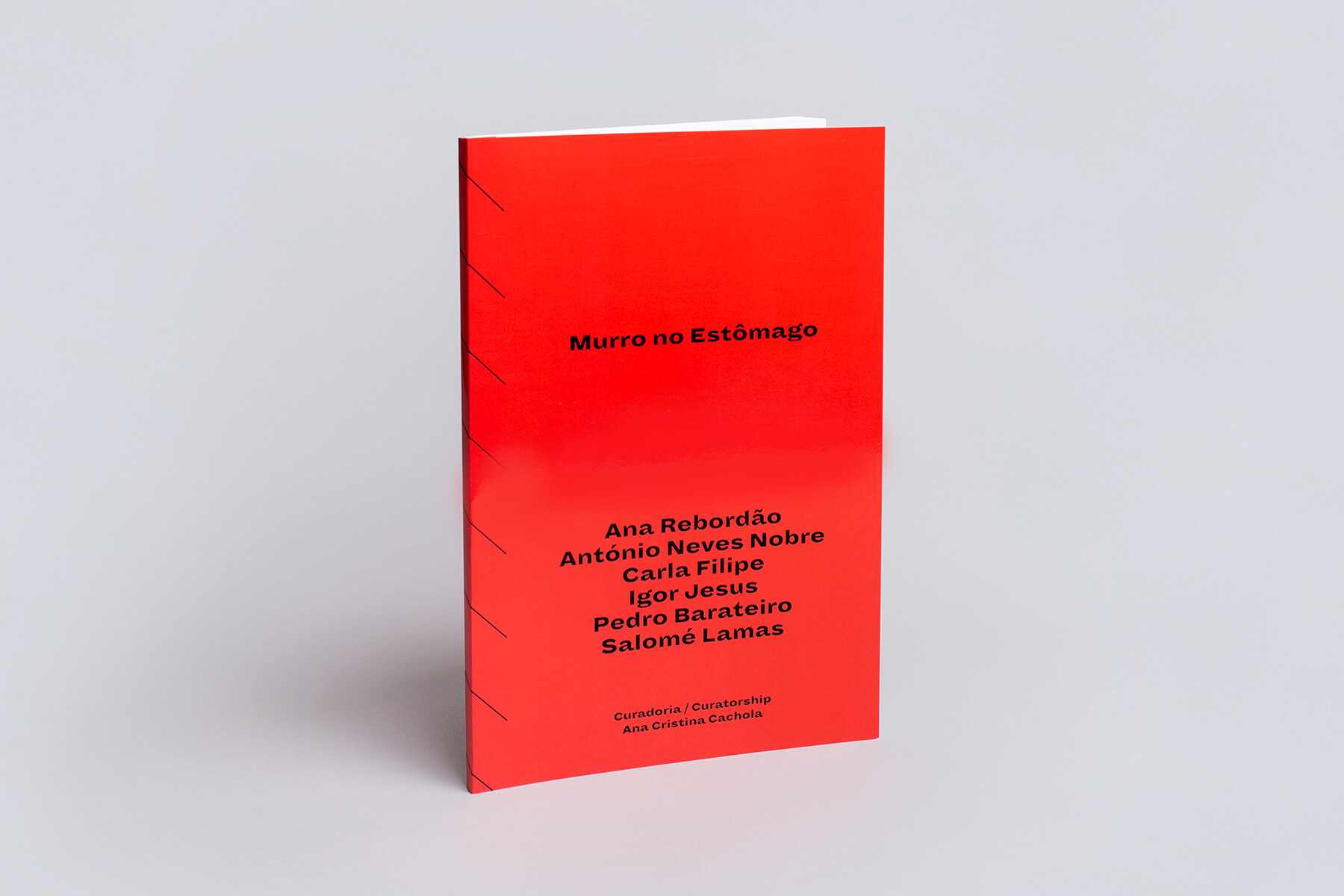This is the catalogue for the group exhibition Murro no Estômago (Punch in the Stomach), which was on view at Boavista Gallery between February 8 and April 21, 2019. Curated by Ana Cristina Cachola, the exhibition featured artists Ana Rebordão, António Neves Nobre, Carla Filipe, Igor Jesus, Pedro Barateiro and Salomé Lamas. Ana Luísa Bouza has designed the publication. Over 64 pages, it presents reproductions from the artists’ work as well as bilingual text contributions by Marta Espiridão, Miguel Mesquita, Stephan Dillemuth, João Ribas, Antonia Gaeta and Deirdre Boyle.
“This publication traces a timeline parallel to the exhibition Murro no Estômago and, by reproducing a series of relevant texts, provides context to many of the artists’ epiphanies manifested in that show.”
-Tobi Maier
“The rupture that comes from this punch in the gut happens when a work invades the subject and confuses it with the symbolic resistance to this invasion: it is this intrusion in subjectivity that provokes a kind of traumatic moment, in other words, an unspeakable, visceral, often precognitive experience.”
-Ana Cristina Cachola
“It is in this limbo between the comfort zone and the confrontation zone, that Ana Rebordão’s works are positioned. Filmed mostly in her comfort zone – between her home and her parents – (…) All of these videos position us between this moment of waiting, in which we presume the usual outcome of familiar situation, only to see it crumble in our expectation – and a sense of restlessness resulting from the realization that not everything is what it seems.”
-Marta Espiridião
“The paintings, which are untitled and lack any descriptive reference, are not answers to any interpretation, or even motivation, pre established by the artist. For that reason they depend upon an autonomous reading based on each viewer’s own references, which accentuates the unrest inherent to the condition of the unknown.”
-Miguel Mesquita
“Carla Filipe: The title of this work is Assault Order [2012]. This was a specific kind of theft that was permitted during a fixed time period, which I believe was three hours, when you could go to a grocery store and take some food. The owner was only permitted to ask for mercy – in order not to have too many of his goods taken. This occurred in Portugal, during the First Republic era [1910-1926], a very turbulent period, and this measure was a way to respond to the shortage of supplies”.
-Carla Filipe e Stephan Dillemuth
“Continuing his interest in the sensorial limits both of human perception and technical forms of vision, the exhibition’s single work registers light as a surface. Rather than a phantasmagoric image captured on a screen, the skin of LEDs emits the light of the image to the viewer materially, bursting in and out of darkness.”
– João Ribas
“AG:Do you mean it has to do with a precise idea of art/life or that it has to do with artistic representation?
BP: Both, because art is one of the most direct ways of representing life. In general, or at least in the Western world, other cultures will certainly have other ways of thinking. Within the capitalist system in which we live, systems of representation are so interconnected that it is impossible not to be complicit and not to be part of the system.”
– Antonia Gaeta e Pedro Barateiro
“This is a film that will leave you thinking about colonialism and its abusive aftermath, about the personal sources of violence and aggression that can be tapped by political powers around the globe, about the foot soldiers who enthusiastically wage clandestine wars, hidden and invisible. It is also about madness and sociopathy, and the line dividing heroes from villains.”
-Deirdre Boyle





